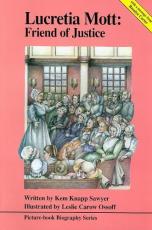“Truth for authority, not authority for truth.” Lucretia Mott stood firm and was not one to shy away from controversy. “I am no advocate of passivity. Quakerism as I understand it does not mean quietism," she said. A staunch abolitionist and an ardent Quaker pacifist, she was also one of our country’s early outspoken champions of women’s rights—and the subject of my first biography for young readers.
In 1848, Lucretia Mott and Elizabeth Cady Stanton led the Seneca Falls Convention in upstate New York. They read aloud the Declaration of Sentiments calling for equal rights for women, a document that was signed by one hundred women and men. The convention was mocked by the press at the time, but it is remembered today as the beginning of the movement that led to the passage of the 19th Amendment, granting women the right to vote.
Two years later, in October 1850, Lucretia Mott helped organize the National Woman’s Rights Convention in Worcester, Massachusetts. One thousand delegates from eleven states came together to demand the right to vote, own property, obtain a college education, and pursue careers. As before, most of the press was dismissive (or scornful). The New York Herald headline read “AWFUL COMBINATION of SOCIALISM, ABOLITIONISM, AND INFIDELITY. The Pantalettes Striking for the Pantaloons. Bible and Constitution Repudiated.” The October 23, 1850, article referred to Lucretia’s countenance as “all bone, gristle, and resolution.” “We should take her to be an elderly lady, indomitable as Caesar.”
Despite the newspaper accounts (and with the benefit of hindsight), we can say these women left their mark. Throughout the convention, Lucretia was forceful as ever, arguing that “woman was the equal of man in everything pertaining to human rights” (a bold thought to many 170 years ago).
Many of the participants at the convention were already adherents to the cause. Others needed to be converted and Lucretia would win them over. She was already revered—in some circles—as a preacher and public speaker. (She frequently addressed crowds of 2,000 and more). She had a way with words. “Some time ago, if a woman could make a shirt, turn a pancake, and write her name at her marriage, she was educated. But she is beginning to understand that she is entitled to something more,” she said to those assembled at Brinley Hall in Worcester on October 23, 1850.
As we go to vote this week, let us remember that more than half of us owe thanks to Lucretia Mott and the other women who have come before us. They helped us gain a right long overdue.
